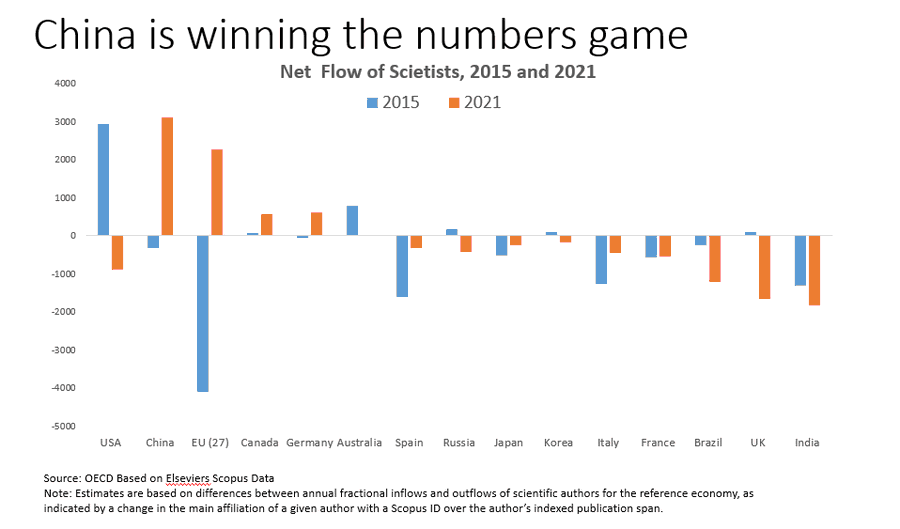beijingwalker
ELITE MEMBER

- Joined
- Nov 4, 2011
- Messages
- 65,187
- Reaction score
- -55
- Country
- Location
Xie Xiaoliang is latest Chinese scientist to give up US citizenship
- Former Harvard professor is part of a trend of returning scientists that is putting China in race for talent lead
- The biophysical chemist is best known for DNA breakthrough that makes it possible to sequence an individual human cell
Published: 3:05pm, 9 Jun, 2023
Biophysical chemist and former Harvard professor Xie Xiaoliang. Photo: Weibo
A prominent scientist has given up his US nationality to become a citizen of China, the latest in a growing number of Chinese researchers returning to their home country.
Xie Xiaoliang, a biophysical chemist and former professor at Harvard University, has been listed as a domestic member of the Chinese Academy of Sciences (CAS), which did not explain Xie’s decision.
He previously was a foreign member of CAS, whose rules permit a change to domestic membership after obtaining Chinese citizenship. Xie has yet to respond to a request for comment.
Xie, who was born in China and trained in the United States, is best known for his team’s invention in 2012 of the single-cell DNA amplification method. This enables the sequencing of individual human cells in the hunt for mutations that can cause genetic diseases or cancer.
The method meant “even one mutation out of 6 billion base pairs” of DNA could be discovered, Xie said on the Peking University website in 2018.
Meanwhile, Sun Licheng, a scientist from Sweden, has also transferred to domestic membership of the academy, according to the CAS website. He returned to China to become a chair of chemistry at Westlake University in April 2020.
Sun, a former professor in molecular electronics at the KTH Royal Institute of Technology in Stockholm, was elected as a distinguished professor of the Swedish Research Council in 2017.
These are not the only examples of CAS foreign members dropping their overseas citizenship to become domestic members.
In 2017, two eminent scientists – including 1957 Nobel physics laureate Yang Chen-ning – renounced their US citizenship to switch to domestic membership of the academy.
The US has been losing talent to its Asian competitor at an increasing rate since former president Donald Trump launched the China Initiative in 2018 to combat suspected Chinese theft of American secrets and technology.
A joint study last year by Princeton, Harvard and the Massachusetts Institute of Technology found more than 1,400 US-based ethnic Chinese scientists changed their academic affiliation from American to Chinese institutions in 2021 – a 22 per cent increase on the previous year.
According to data published in April by the Organisation for Economic Co operation and Development, the US lost 896 scientific authors in 2021, while China picked up 3,108.
The findings are in stark contrast to 2015, when traffic was reversed, with a gain of 2,920 scientists for the US and a loss of 336 to China.
The OECD’s tracking is based on changes in scientists’ institutional affiliations. An inflow is counted when an author previously affiliated in one country is first seen to be affiliated to an institution in another.
According to the OECD’s latest data, the US is not only losing out to China in the race for scientific talent, with the European Union, Canada and Germany also ahead.
Xie received his PhD in physical chemistry from UC San Diego in 1990 and worked at Pacific northwest National Laboratory and Harvard University for more than two decades.
He was the first tenured professor at Harvard University among the cohort of scholars from mainland China who travelled to the US after the country’s economic reform and opening up in 1978.
Xie, who previously was a member of the United States National Academy of Sciences and National Academy of Medicine, became a visiting professor at Peking University in 2001.
In 2009, he was persuaded to return full-time to Peking University by the leading neurologist Rao Yi, then dean of the university’s school of life sciences, Xie said on the university website.
Rao, now president of the Capital Medical University in Beijing, gave up his own US citizenship and returned to China in 2007, after studying and working in the United States for more than two decades.
Xie said that, after settling down in the US, every time he returned to China he was astonished and moved by its tremendous progress.
“When I returned to Beijing to watch the 2008 Olympics, I was heartened by the Chinese team winning the most gold medals, but I knew we have a long way to claiming first place in the realm of science,” he wrote.
Xie became a full-time professor at Peking University in 2018 and head of the sciences faculty the following year.




